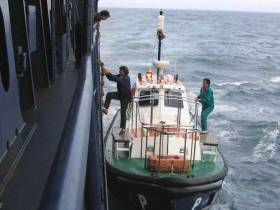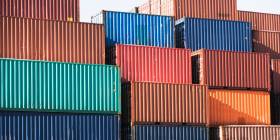Displaying items by tag: SOLAS
Reminder: Guidance on Radio Communications and Distress Alerts Under SOLAS Chapter IV Comes Into Effect in New Year
The Department of Transport has issued a reminder regarding several circulars in relation to compliance with Chapter IV of the Convention for the Safety of Life at Sea (SOLAS) as it pertains to radio communications and distress alerts.
These circulars detail the following:
- Guidance for the Reception of Maritime Safety Information and Search and Rescue Related Information as required in the GMDSS
- Flow Chart: GMDSS Operating Guidance for Ships in Distress Situations
- Procedure for Responding to DSC Distress Alerts by Ships
- Guidance on Distress Alerts
The guidance set out in these circulars will come into effect on 1 January 2024 and mariners are requested to ensure that they comply with the relevant procedures.
Each of the above circulars is included as an appendix to Marine Notice No 77 of 2023, attached below.
The Department of Transport wishes to highlight the provisions of SOLAS Chapter V to small, privately owned recreational craft.
Although regulation 34 of Chapter V — “Safe navigation and avoidance of dangerous situations” — only applies when proceeding to sea, the department advises all recreational craft users to comply with the voyage planning principles.
These were previously highlighted in Marine Notice No 19 of 2021 following an MCIB report into the rescue of five Kinsale Yacht Club sailors from the yacht Loa Zour amid severe storm conditions off the Spanish coast in June 2019.
In Marine Notice No 30 of 2023, the department underscores this as well as the benefits of radar reflectors, the need for access to an illustrated table of the recognised life-saving signals, requirements around the assistance of other craft, the consequences of misuse of distress signals and more.
Full details can be found in Marine Notice No 30 of 2023 attached below.
Product Recall Notice for Pirolec L-35 Rocket Parachute Flare Following Fatal Incident
Marine Notice No 7 of 2023 advises of a safety notice issued by the Dutch Safety Board for rocket parachute flares relating to model L-35 or L-35A manufactured by LECEA Sistemas Pirotécnicos Avanzados, S.A. The manufacturer has also issued a recall notice.
All owners of a Red Rocket Parachute Flare from Pirolec, type L-35/L35A, batch 0525/2021–113 are requested to stop using flares from this batch and replace them. If in doubt, operators should contact the manufacturer at [email protected].
This safety alert follows a fatal incident onboard a Dutch vessel when a flare reportedly exploded prematurely during an attempted launch.
It is important to note that the SOLAS Convention requires no less than 12 rocket parachute flares, complying with the requirements of the Life-Saving Appliances Code, shall be carried and be stowed on or near the navigation bridge.
Regulations For Pilot Transfer Arrangements
The Department of Transport, Tourism and Sport (DTTAS) reminds the owners of ships and fishing vessels, as well as port authorities, pilots, seafarers and more, of the importance of proper pilot transfer arrangements.
These arrangements — with include pilot ladders — must be certified, maintained and rigged in accordance with Chapter V, Regulation 23 of the International Convention for the Safety of Life at Sea (SOLAS).
Ships engaged on voyages in the course of which pilots are likely to be employed shall be provided with pilot transfer arrangements in accordance with the same regulation.
Full details are included in Marine Notice No 33 of 2019, a PDF of which is available to read or download HERE.
Marine Notice: New SOLAS Requirements For Verification Of Gross Mass Of Containers
#MarineNotice - The latest Marine Notice from the Department of Transport, Tourism and Sport details new SOLAS requirements for the verification of the gross mass of shipping containers.
Following concerns raised internationally by the shipping industry in relation to the mis-declaration of container weights, the International Maritime Organisation (IMO) has amended the Safety of Life at Sea Convention (SOLAS), Chapter VI, Regulation 2. These changes come into force internationally on 1 July 2016.
More details of these changes are included in Marine Notice No 5 of 2016, a PDF of which is available to read or download HERE.
Marine Notice on Changes to Lifeboat Release Mechanisms
#NEWS UPDATE - A recent Marine Notice from the Department of Transport, Tourism and Sport (DTTAS) advises on the adoption of new international resolutions pertaining to SOLAS regulations and changes to the International Life-Saving Appliance (LSA) Code.
The changes are intended to establish new stricter safety standards for lifeboat release and retrieval systems, aimed at preventing accidents during lifeboat launching, and will require the assessment and possible replacement of a large number of lifeboat release hooks.
Both of these changes are expected to come into force from 1 January 2013 with a view to full compliance by July 2019.
The Maritime Safety Committee of the International Maritime Organisation has also approved new guidelines for the evaulation and replaceent of lifeboat release systems, in which the DTTAS will require fall preventer devises, or FPDs, to be fitted.
Complete details for shipowners, ship operations, shipmasters and seafarers are included in Marine Notice No 54 of 2011, a PDF of which is available to read and download HERE.
































































